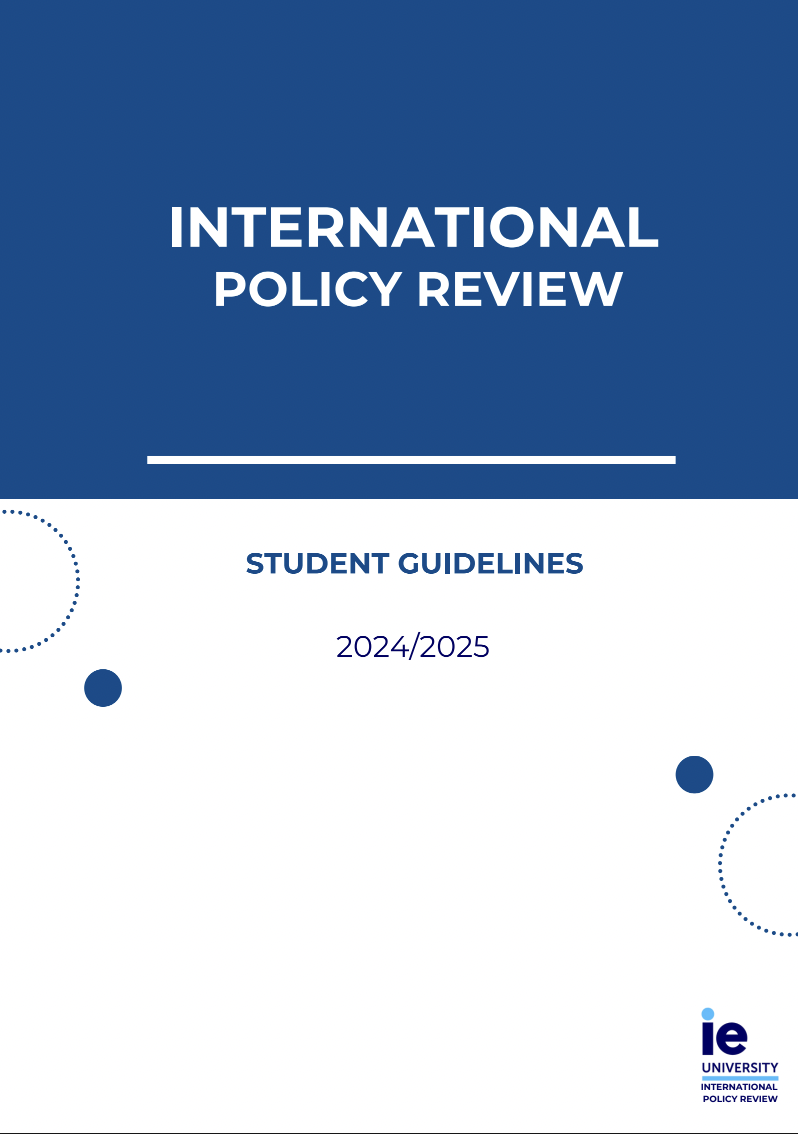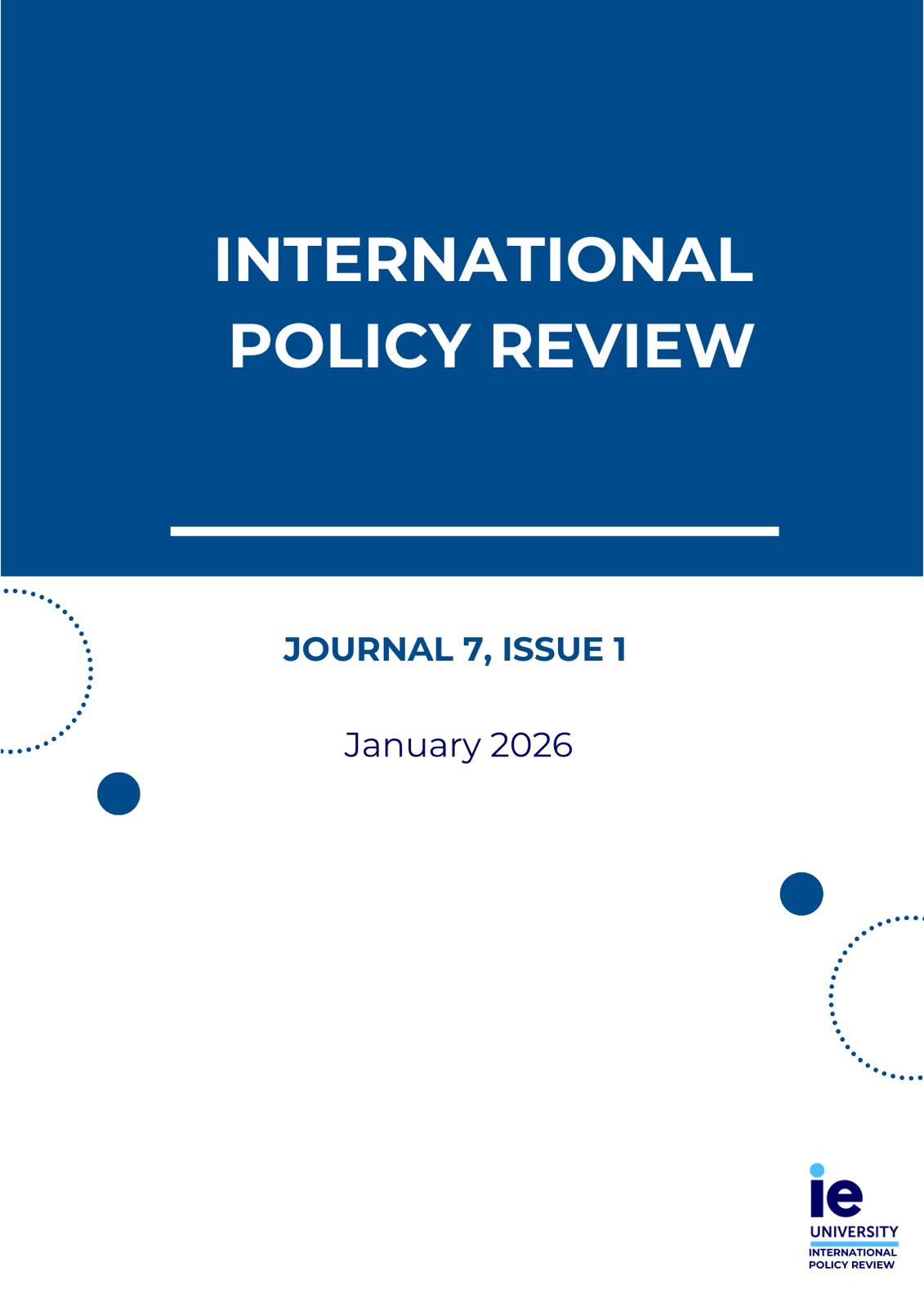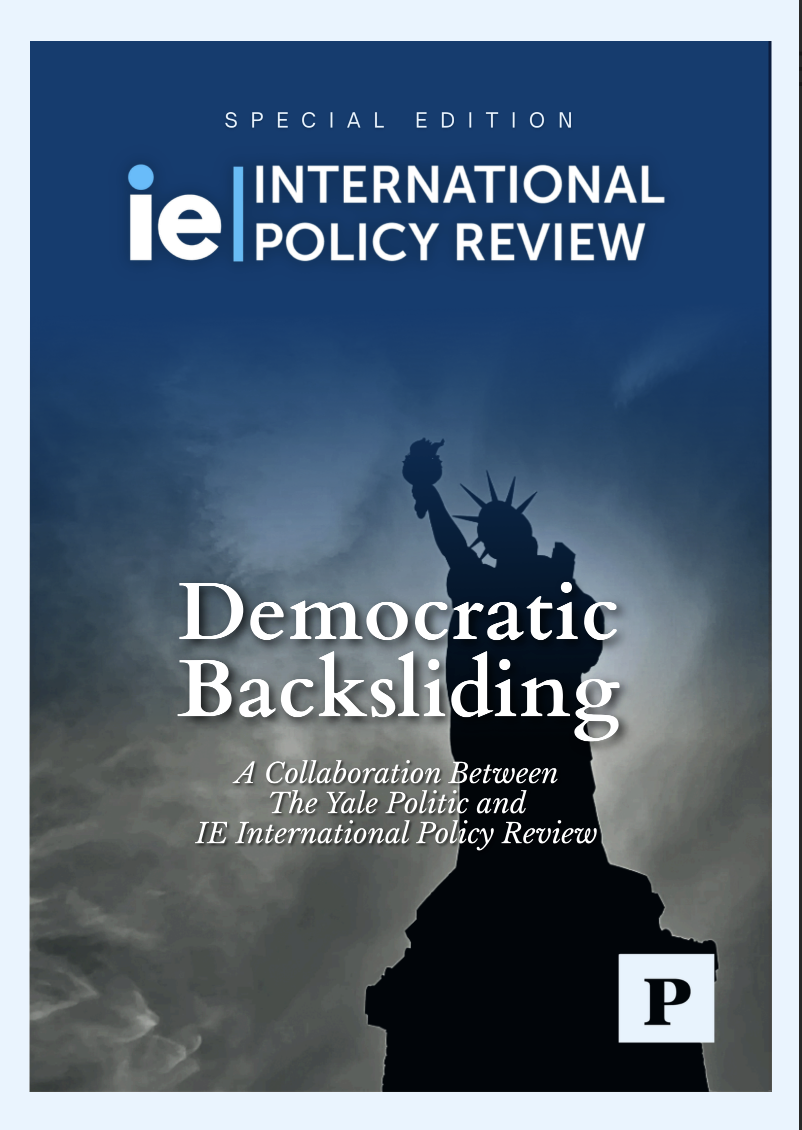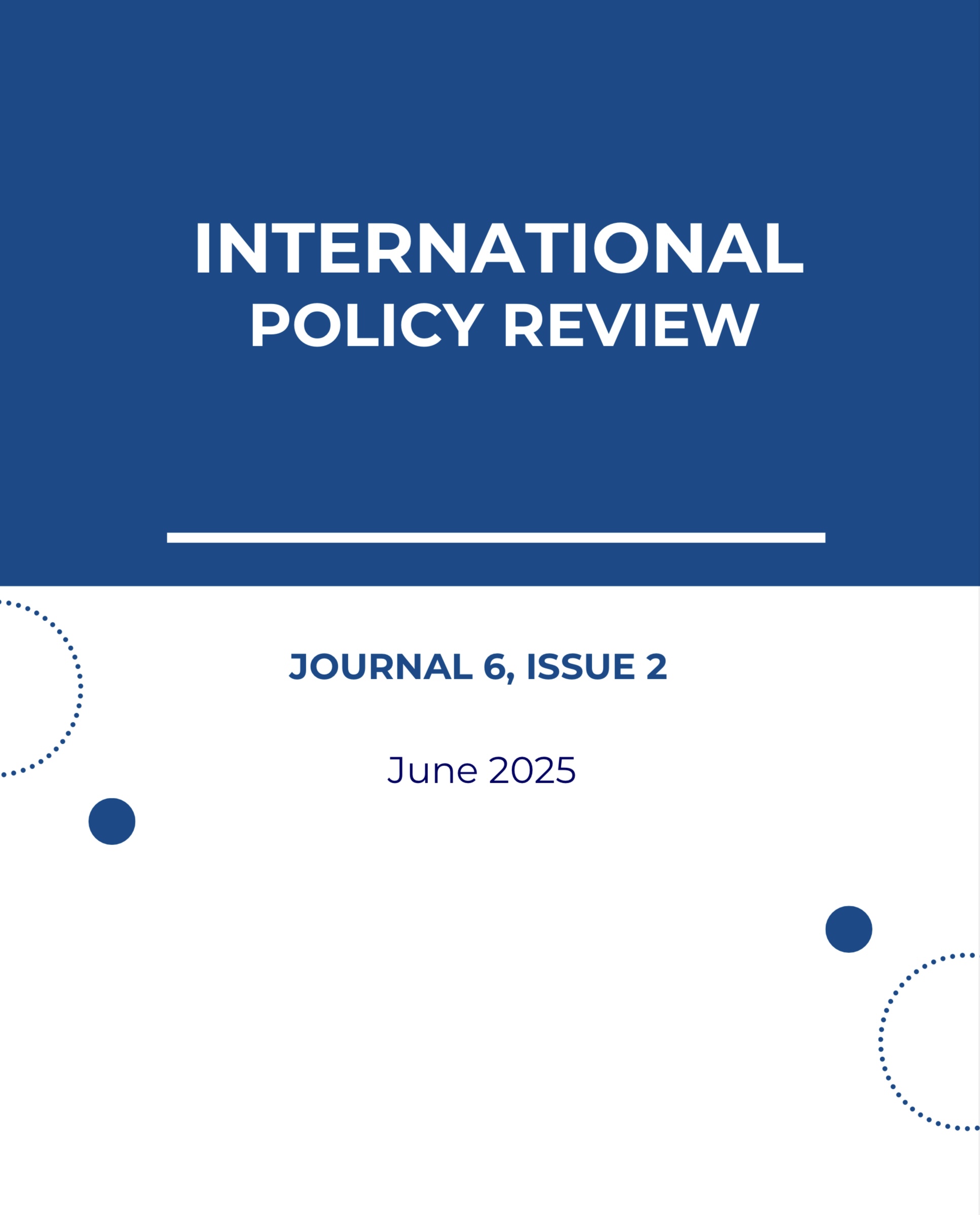
IE INTERNATIONAL POLICY REVIEW
The IE International Policy Review is a student-led academic journal founded in 2018. Since then, the Editorial Board has aimed to publish the highest quality social sciences academic papers. Our review provides everyone, starting from their first year, the opportunity to master the art of writing and editing. This fosters the ability to critically analyze global events and explore creative policy-making solutions.
The IE International Policy Review is built on the belief that intellectual debate is essential for fostering innovation. We believe that development in every field is a direct consequence of thoughtful and factual analysis, regardless of one’s political or social standing. The review welcomes every respectful opinion and encourages a scientific and academic approach to current events.
LATEST PUBLICATIONS
Acknowledgements
My gratitude goes to the Vice Editors-in-Chief, Isabela Rodacki and Alexia Dimitriou, for being essential in keeping the Review rigorous and functioning, as well as to the Heads of the Chapters, Henri Klein, Andreea Pascaru, Alberto Alonso Inope La Rosa, and Vrushab Shekhar, for their wonderful work.
A special thanks to all the members of the team, Agustin Plaza, Sofia Falleiros, Maria Sofia Affronti Casella, Maria Awar, and Kaya Schmidt, Gabriela Vazquez-Guillén Navarro, not only for their dedication, but for believing steadily in this project and trusting its vision. A special thanks goes to Elena Pantè for going above and beyond to ensure that this issue embodies the love she has for her discipline — passion is at the core of the IPR, and she does everything to keep that fire alive. My deepest gratitude also goes to Weronika Von Lonski, for her commitment to this project, and to the events team, Aicha Fehri and Elena Karam, for ensuring that the IPR is more than just words, but that it also brings concrete value on campus.
Last, but definitely not least, thank you to all our partners, chapters, and collaborators for giving us the opportunity to keep growing, improving, and enjoying the process along the way. A special thanks to Eric Peterson for enabling connections and fostering our growth.
As always, thank you to IE SPEGA and IE Campus Life for offering us the platform to continue
pursuing this project and for believing in us, we are proud to be part of the IE community.
Faithfully,
Matilde Romagnoli
IPR Editor-in-Chief
Writing a paper is never a simple act; it is an exercise in uncertainty, especially in an age in which reality itself feels increasingly complex, fragmented, and relentlessly politicised. Information is no longer merely accessed but it is contested, framed and fought over. In such a context, the most valuable skill we can cultivate as students is the capacity for free and reflective thought.
To write, and to edit, is to enter a space of constant self-interrogation. It forces us to ask whether what we present truly reflects the world as it is, or rather the world as we see it, shaped by assumptions. It compels us to confront opposing theses, to sit with discomfort, and to reassess beliefs we may have long taken for granted. For an editor, this process is even more demanding: one must learn to distinguish between an argument that requires refinement and to recognise when argument may be valid even if it does not align with one’s own views.
At the IE International Policy Review, every article published is the product not solely of an individual author’s insight, but of a vibrant community that challenges perspectives, sharpens ideas, and pushes one another beyond familiar comfort zones. Freedom of thought cannot exist in isolation; it is born from the encounter of diverse ideas, through confrontation and, at times, productive clash. It is our hope that within this issue, readers will find not definitive answers, but questions worth lingering over and, above all, food for thought.
Clearly, at the heart of this journal there is a shared effort, and I owe my deepest gratitude to an Editorial Board that made collaboration its defining strength.
In this special edition, the Yale Politic and the IE International Policy Review come together to analyse the topic of Democratic Backsliding.
Acknowledgements
This issue would not have been possible without the contributions of many valuable people.
We are particularly grateful to the entire IE School of Politics, Economics and Global Affairs for their constant encouragement and support, especially to Borja Santos Porras, Fernando Menéndez González, Betsey Medow, Santiago Sierra, and Agostina Blengino for believing in us.
A special thanks to IE Campus Life, particularly Valentina Farray and Elisa Hicks, for always dedicating their time and kind words to us.
Thanks also to the past Editors-in-Chief, Karan Khosla, Kyler Cade, and Zachary Zimmermann, for entrusting us with carrying forward the vision they had for the IE International Policy Review.
We would like to express our deepest gratitude to our partners, without whom we would not have been able to grow so much over the past few months.
A special thanks to Giuseppe Valerio Bonanno, Francesco Fernando Annese, and Pietro Zaccardo from Bocconi Advocacy & Litigation for showing great enthusiasm since the beginning of our collaboration and for their incredible work.
A heartfelt thanks also to George Newcombe from The Sundial Press for the exciting projects we had the pleasure of sharing.
Our gratitude also to the IE MUN Committee for our exclusive 2024 collaboration.
Most importantly, thanks to all the writers, editors, and past and present members of the IE International Policy Review who allowed us to guide them on what we hope has been a pleasant writing journey. We thank you for your hard work, ideas, and great articles. Without you, this review would not exist. You represent the mission of the IPR, and we are proud to have you.
Last but not least, thank you to our wonderful team for working incessantly and with the greatest passion for this review to be out today. Thanks to Claudia Espinosa Segura, Paul Prinz, Vanessa Ileana Chiaoaru, Nikola Pantelić, Stephanie Villamor, Alexia Dimistriou, Lucas Phillips, Alberto Alonso Inope La Rosa, Vrushab Shekhar, Francesca Etienne, Alfredo Echeverria Castro, Anastasiia Bolkhovitina, Andreea Pascaru, Constantine Mosch, Gabriella Vázquez-Guillén Navarro, Isabel Goméz Araujo, Isabela Bortolotto Rodacki, and Weronika Von Lonski.
A special thanks to our advisory committee for supporting us throughout the publication process, especially to Ecab Amor Vazquez, Theresa Amor-Jürgenssen, Alejandro Dib Parada, and Aurora Dell’Elce.
Finally, thanks to our wonderful Mia Leonardo for making sure the IE International Policy Review always “looked great” and for turning us into the professional club we are. We are immensely grateful for your help and dedication.
As we celebrate the 6th Journal and the 2nd issue of the IE International Policy Review, we also take pride in the diversity of articles, viewpoints, and opinions that this publication brings together. At a time when differing perspectives and approaches are often criticized or silenced, we choose to celebrate them.
Every article in this issue upholds the academic integrity and standards of our review. Each contribution supports its thesis with facts, data, and reputable studies. Readers will notice that the range of topics covered is broad and ambitious, but behind every piece lies the best effort of our writers and editors to challenge themselves, move beyond their own biases, and consider alternative viewpoints.
The IE International Policy Review is proud to be a space where undergraduate students can engage in academic discourse, welcome contrasting opinions, and transform them into well-balanced and thoughtful work.
With this in mind, I would like to take a moment to explain how our review stands apart. The IE International Policy Review is not merely a publication outlet, it is a shared journey we offer to our peers. Writers and editors are supported from the very beginning: from our initial meetings where we explain the process, through the stages of brainstorming, research, and editing, to the multiple submission deadlines that ensure steady progress and refinement. We believe this step-by-step process is a fundamental part of what the IE International Policy Review offers. It reflects our commitment to academic writing as a collaborative endeavor rather than an individual task. With this issue in particular, we hope to convey a clear message: great things are achieved together. In a time marked by division and violence, we stand by the value of working through our differences to achieve a shared goal, in this case, a meaningful and well-crafted paper.
As an undergraduate review, we hope that this message deeply resonates through everything we do. On behalf of the entire editorial team, I want to sincerely thank all the writers and editors who contributed to this issue. Thank you for believing in our vision, and for choosing to be part of it.
Sincerely,
Matilde Romagnoli
The IE IPR Editor-in-Chief




